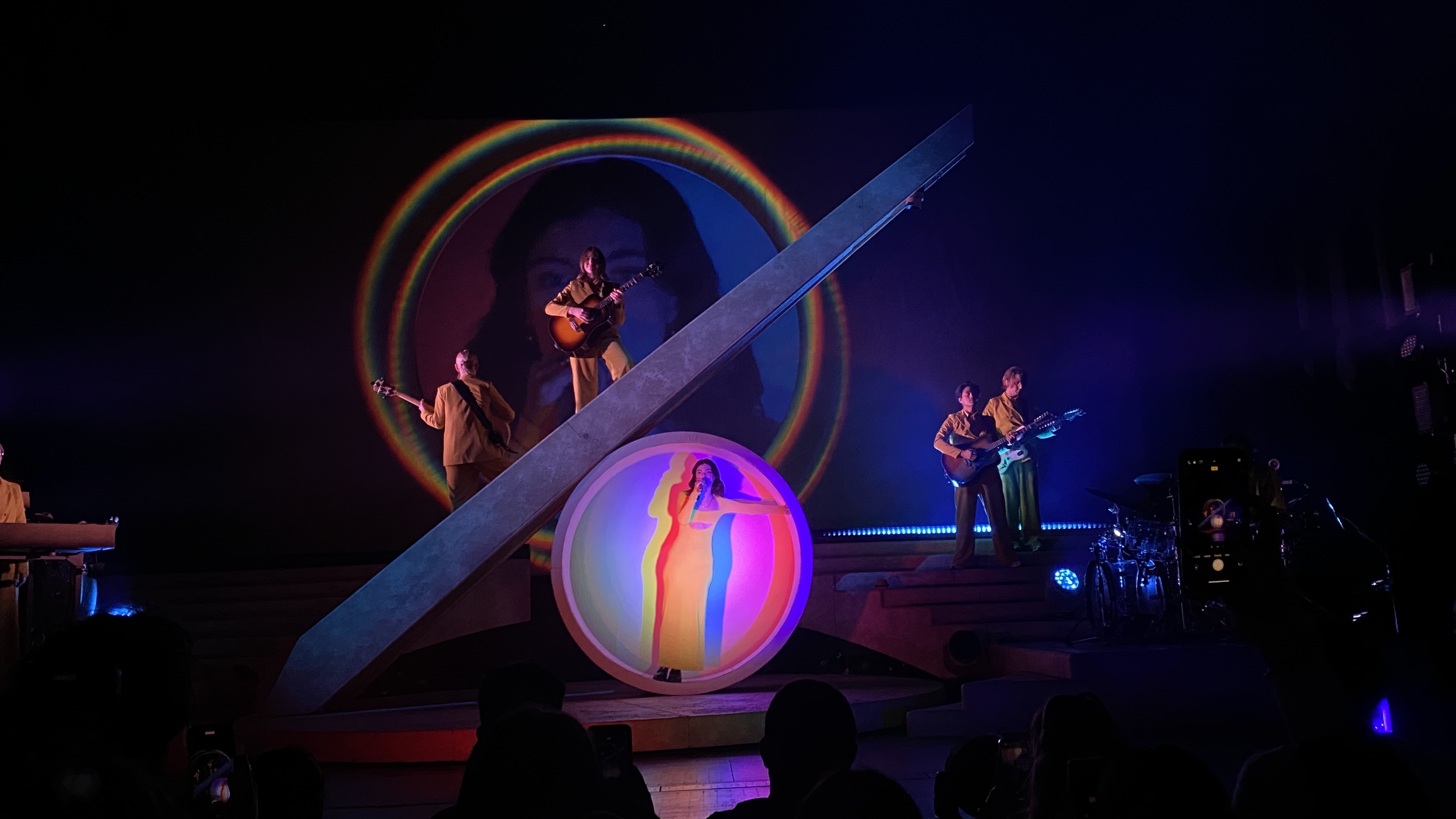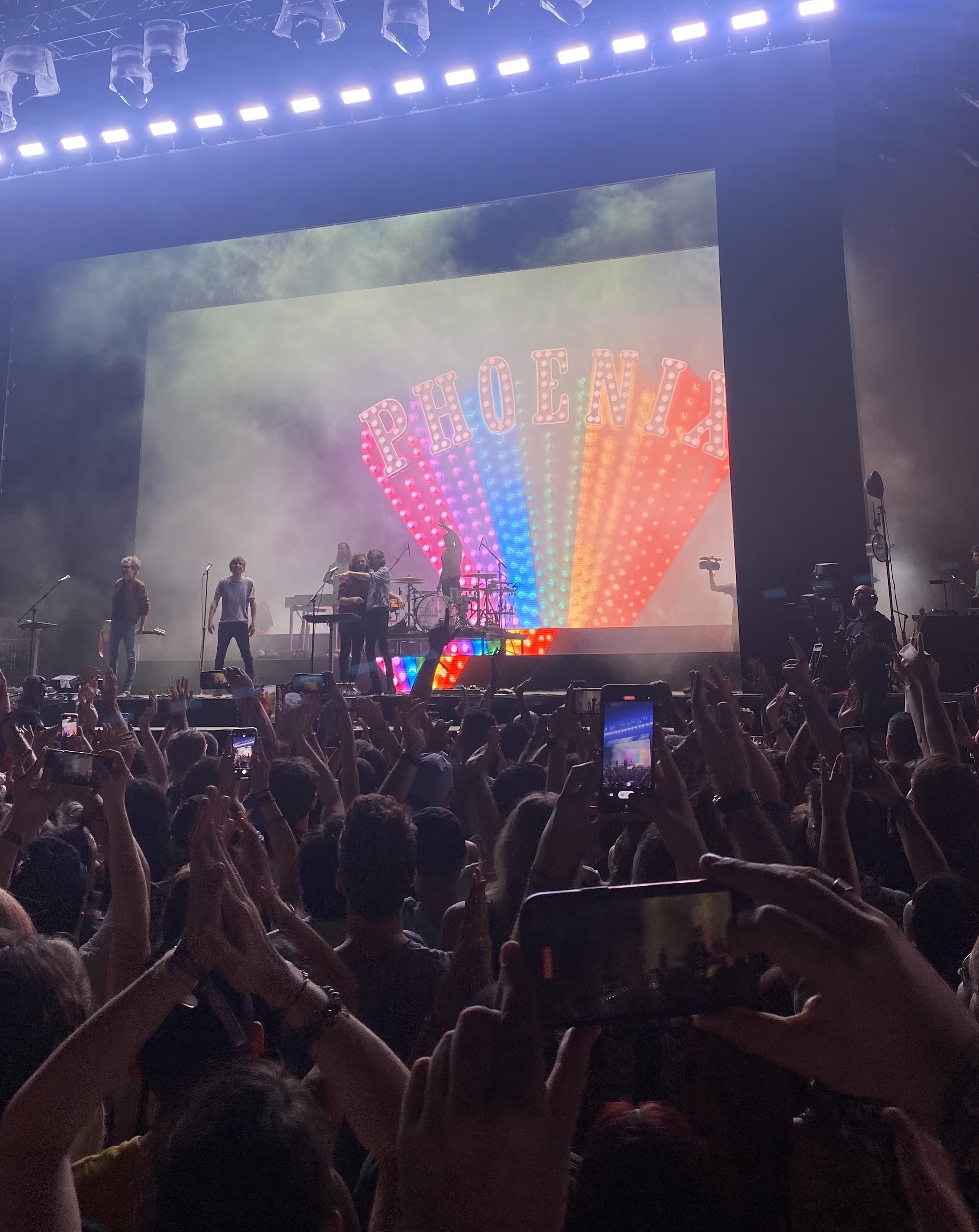
On Dancing Through a Pandemic
We punctuate every word with the landings of our feet. It feels like an exhalation, like the outpouring of a sigh we’ve been holding in for these past three years.
By Naava guaraca
8.24.2022
One of my favorite hobbies is getting on planes for trips that are obscenely short and highly specific: 18 hours in Chicago to see Harry Styles on his first ever solo tour; two days in Denver to watch Mitski and Death Cab for Cutie play the legendary Red Rocks Amphitheater; 24 hours in Toronto to see Radiohead. My spontaneity has taken me around the world, and when COVID started, it felt like the stagnant nature of my childhood returned. Trapped in an apartment, I’d suddenly gone months without flying.
The past three years have conditioned us to fear public gatherings and large crowds. We’ve been warned away from the desire to congregate. We’ve been made to feel that it’s morally repugnant to gather in groups. We reluctantly embraced a new normal in 2020 when it became clear that these new ways of living were not going to loosen their grip any time soon. And so we find ourselves here, amidst a fair amount of confusion about how to act. Live shows are back, gathering is allowed again. We’re craving a return to normalcy, but we haven’t forgotten the way it felt to be let down. The trauma of enduring a pandemic combined with the expectation to move beyond said trauma in a swift and timely manner has devolved into a lack of knowledge on how we’re meant to move forward. As Bessel van Der Kolk writes in The Body Keeps the Score, “Along with language, dancing, marching, and singing are uniquely human ways to install a sense of hope and courage.”
Florence and the Machine’s most recent album, Dance Fever, incites just that: fervent movement. Her last single released before the album dropped was “Free,” which begins with the lyric, “Sometimes I wonder if I should be medicated.” Earlier this year, I’d bought a plane ticket to LA three days prior to the start of Coachella and gone to the festival on a whim, accompanying my best friend to Palm Springs in an act of necessary spontaneity. I listened to “Free” for the first time on my flight home: the song punctuated the trip with confirmation that chasing live music will always be worth it: I hear the music, I feel the beat, and for a moment when I’m dancing, I’m free. Florence Welch, who dances on stage at every one of her shows, often does so barefoot, feeling the surface under her feet as if to wholly connect herself to the music. My mother recently told me to go outside after a rainstorm and stand in the grass barefoot. When there’s lightning, standing on the earth allows for the absorption of that electricity.
In April, I saw Lorde headline Radio City on her Solar Power tour. Returning to live shows for the first time since her 2018 Melodrama tour, she’s contained her tour to a slew of theaters as opposed to filling arenas. At each show, she excitedly shares how quickly each show sold out, telling us that, “If you’re here, it means you bought a ticket in five minutes.” Playing a variety of songs from all three of her albums, her shows leave us out of breath and wanting more. They’re filled with choreographed moments to tracks from Solar Power as well as moments of pure joy as she returns to, “I’m waiting for it, that green light, I want it!”
She fills the silence between each song with passionate monologues and tidbits of conversation. Before “Ribs,” a fan favorite off her freshman album Pure Heroine, she asks everyone to consider their 15-year-old selves. 10 years from her own 15-year-old-self, she invites the past into the room and asks that we forgive ourselves. As the emotion wells, everyone starts to dance. By the bridge (”I want ‘em back I want ‘em back the minds we had the minds we had”) the energy is vibrant and everyone is jumping. We punctuate every word with the landings of our feet. It feels like an exhalation, like the outpouring of a sigh we’ve been holding in for these past three years. It’s pure bliss.

“If you have anything in you you want to release,” she says as she introduces her song “The Louvre,” “please do so during the breakdown of this song.” Movement is a necessary aspect to every one of her shows. Lorde has recently come under a lot of criticism and Twitter meme-age about a time in 2017 when she shushed the crowd before playing “Writer in the Dark” (I was at that show at Bowery Ballroom and I fully believe the shush was warranted, but that’s just one woman’s opinion). She’d wanted a moment to sing without a microphone, to feel like she was singing to a room full of friends and peers. This intimacy is a necessary part of her performances, and she’s held steadfast in the belief that her shows are experiences to be had in the present moment. It’s about collective joy. By the time we hit the encore of “The Louvre,” movement feels natural to the entire crowd. There’s no question of whether or not we’ll respond physically. We just do.
I’m drawn to music about dancing in general, music that celebrates the way bodies move. On Maggie Rogers’s freshman album, she writes, “This time I know I’m fighting, this time I know I’m back in my body.” In a 2011 Car Seat Headrest song, Will Barnes writes, “As long as we move our bodies around a lot, we’ll forget that we forgot how to talk, when we dance.” And of course, as Bowie so eloquently exclaims on “Rebel Rebel”: “We like dancing and we look divine!” Mitski’s recent album, Laurel Hell, celebrates 80s dance-pop music, giving us chances to dance despite her traditionally heartbreaking lyricism. “Después de la Playa,” a favorite on Bad Bunny’s recent release Un Verano Sin Ti, reminds me of dancing at Quinceañeras. My father would drag me to the floor, ignoring the stubborn cries that I was too tired, and position my hands against his, instructing me on how to move my hips. This wealth of contemporary music seems to be focused on resurgence and joy, sounds we can experience physically.
Bessel van der Kolk writes of the past: “We were more open to the value of other age-old, non-pharmacological approaches to health that have long been practices outside Western medicine, ranging from breath exercises and chanting to martial arts like qigong to drumming and group singing and dancing. All rely on interpersonal rhythms, visceral awareness, and vocal and facial communication, which help shift people out of fight/flight states, reorganize their perception of danger, and increase their capacity to manage relationships.” Like my mom telling me to stand in the grass for the sake of self-improvement, dancing will save us. In America, we tend to favor immediate fixes—when you’re sick, you go to the doctor for medicine—but our recent traumatic experiences can’t all be fixed with a prescription. We have years of unlearning to do, and that starts with remembering what it means to be in our bodies and unapologetically move through the world with ease.
In an ever-persistent search for the perfect crowd, three of my friends and I flew to Barcelona in June for Primavera Sound. The audience was palpably different from anything I’ve experienced in America; I’ve been to Coachella, Austin City Limits, Gov Ball, and so many concerts that I stopped counting years ago. Rather than reacting to the feeling of live music, Americans tend to stand still and listen intently. Primavera was different. At two in the morning, as we sprinted from Dua Lipa’s mainstage set to the opposite side of the festival where Charli XCX was playing, adrenaline kicked in and shook hands with the Red Bull coursing through my system. At two in the morning, the festival still had several hours left to it, but the energy radiated like everyone had struck just the right level of drunk and no one was ready to go home. I never felt the urge to reach for my phone. We danced, we danced, we danced.
On the last day of the festival, tired from a week spent traveling and two days spent watching music until the late hours of the morning, my body carried me towards the front of the stage for Phoenix’s headlining set. The crowd was at its thinnest, the only people left were those of us who couldn’t imagine being anywhere else. It feels like a fever dream looking back at it; I don’t think my feet were firmly planted on the ground for a single second. As Florence says in “Free”: “the music picked me up, put me down, picked me up, put me down.” I smoked a cigarette and watched the moon hanging low in the sky above the mainstage. It was like settling a craving I’d been chasing for the past three years.

